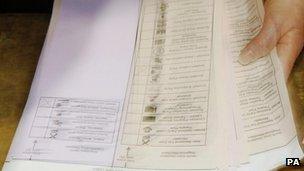Scottish local election: First stand-alone poll in 17 years
- Published

Scotland's 32 councils collect refuse, look after the elderly and teach the country's school children
For the first time in many years, the 3 May local elections will take place without being overshadowed by a Scottish election.
The last time the council elections were not held on the same day as the election to the Scottish Parliament was back in 1995 - an era before devolution.
The fact the two polls are now completely separate again will give voters a chance to think carefully about the options for their local services - but some councillors fear only about one in three of us will actually bother to vote.
Typically, between 40 and 45% of people cast their vote in council elections in the 1980s and early 90s. Many worried about what was then seen as a low turnout.
The first election to the the Scottish Parliament in 1999 coincided with the local elections.
Nearly 6 out of 10 voters took part - disappointing, perhaps, for the architects of devolution but still a figure unprecedented for local elections in modern times.
In the hope of maintaining the apparent resurgence in interest, the two elections came to be formally linked or "coupled" so that they always took place on the same day. However, turnout declined and in 2007 just over half of us voted.
But that poll, or rather the count, came to be remembered for the wrong reasons - 142,000 ballot papers for the Scottish Parliament were rejected.
Although the local elections were not affected by the problem, the inquiry into the fiasco recommended that they should be held on a separate day, again to help reduce the risk of a repeat performance.
In May 2007, there was a momentous change to the local elections - they were the first to be held using a system of proportional representation.
The link between individual councillors and wards was broken. Each voter was now represented, typically, by three or four councillors and wards are far larger.
System 'a novelty'
The effect of PR on local government was profound. After the votes were counted, Labour had an outright majority on just two councils - all the other councils on the mainland were run by minority administrations or coalitions.
In fact, the SNP ended up with more councillors across Scotland although Labour received the largest number of first preference votes.
In 2007 the STV voting system was a novelty. Now the parties have seen it in action, they are trying to turn it to their advantage.

The last time the local elections were held in Scotland was in 2007
For each party, deciding how many candidates to field in multi-member wards is something of a dilemma. Fielding too many can be counterproductive and actually spread the vote too thin - field too few and a party may feel it has shot itself in the foot and left itself under-represented.
For instance, the SNP freely admits that in hindsight it should have fielded more candidates in Glasgow in 2007.
In each of the 32 council areas, different local issues will come to the fore - schools, libraries, sports centres, potholes, cuts to local services. But there are some common themes.
The Scottish government is committed to freezing the council tax until 2016. In practice, it is all but impossible for a council to put up the tax so the question is really whether a council is spending its money wisely or if its priorities are in tune with those of the local electorate.
Council payrolls are being cut, 13,000 jobs have already gone - mostly by voluntary means - and a similar number are expected to go this year.
But more radical moves to reshape local services - like proposals for councils in the west of Scotland to work more closely together and an effort by Edinburgh to give the private sector a greater role in some services - have either been dropped or scaled back.
Opinion poll
The votes will start to be counted on the morning of 4 May and the picture should be clear by mid to late afternoon on that day.
The results from some areas are likely to be of national interest.
In Glasgow, Labour and the SNP are fighting a battle royal, while in Edinburgh there is the question over who voters will blame for the trams fiasco.
And across Scotland, this may be the biggest "opinion poll" ahead of the independence referendum. Only the European election in 2014 is scheduled to take place beforehand.
Standalone council elections in the old days were sometimes seen as "mid-term verdicts" on the Westminster government. Will voters use this election to deliver a verdict on the UK coalition or the SNP government in Edinburgh? Or will they focus on their council chamber?